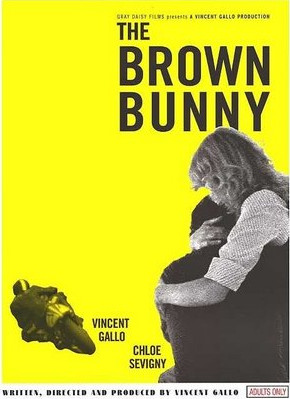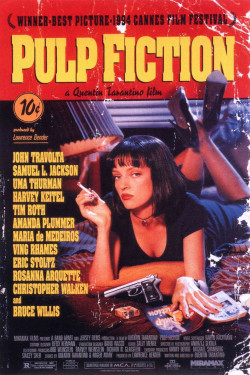Twitter Review: Repulsion
Polanski’s obtuse ‘Repulsion’ mines fear of rape, men, abandonment. 1 great shock & effective spatial horror, but male POV leers and muddles
Polanski’s obtuse ‘Repulsion’ mines fear of rape, men, abandonment. 1 great shock & effective spatial horror, but male POV leers and muddles
 In nine weekends of release, The Hangover has finished in second place seven times in the Box Office Power Rankings. This past weekend, The Hangover passed Star Trek’s $254 million – which means it’s playing with the big boys. It will gross less domestically than Transformers, Up, and Harry Potter, and its reviews were not as strong as Up, Potter, Trek, or Drag Me to Hell. But it’s the movie of the summer because it’s had great legs over a long period of time. In their ninth weekends, Up and Star Trek were out of the box-office top 10. The Hangover was in eighth place with $5.2 million.
In nine weekends of release, The Hangover has finished in second place seven times in the Box Office Power Rankings. This past weekend, The Hangover passed Star Trek’s $254 million – which means it’s playing with the big boys. It will gross less domestically than Transformers, Up, and Harry Potter, and its reviews were not as strong as Up, Potter, Trek, or Drag Me to Hell. But it’s the movie of the summer because it’s had great legs over a long period of time. In their ninth weekends, Up and Star Trek were out of the box-office top 10. The Hangover was in eighth place with $5.2 million.
 The Brown Bunny gave Roger Ebert cancer, and it features a real blowjob. And the girlfriend is dead. In 18 words, I’ve summarized the hullabaloo surrounding (and the post-climactic revelation of) Vincent Gallo’s shockingly vain vanity project from 2003. I can even spare you from the “boring” parts of the movie – basically the first 80 of its 93 minutes – and help you indulge whatever prurient curiosity you might have by pointing to an in-depth description/analysis and video of the oral-sex scene. But the film as a whole is actually oddly fascinating, especially in the context of its initial critical drubbing and the filmmaker’s reaction to that reception.
The Brown Bunny gave Roger Ebert cancer, and it features a real blowjob. And the girlfriend is dead. In 18 words, I’ve summarized the hullabaloo surrounding (and the post-climactic revelation of) Vincent Gallo’s shockingly vain vanity project from 2003. I can even spare you from the “boring” parts of the movie – basically the first 80 of its 93 minutes – and help you indulge whatever prurient curiosity you might have by pointing to an in-depth description/analysis and video of the oral-sex scene. But the film as a whole is actually oddly fascinating, especially in the context of its initial critical drubbing and the filmmaker’s reaction to that reception.
 This week saw the debut of “The 50 Greatest Films,” with the One-Line Review’s Iain Stott compiling responses from 187 movie buffs, including me. The list made me wonder: Has the “film canon” become too ossified? I was frankly shocked that the results were so … ordinary. A top 10 of Citizen Kane, Vertigo, 2001, The Godfather, Casablanca, The Third Man, Taxi Driver, Seven Samurai, Psycho, and Dr. Strangelove is perfectly reasonable and respectable, but it’s also merely reasonable and respectable. Given Stott’s admirable democracy (“[I]gnoring thoughts of position or pedigree … ,” he wrote, “professionals and amateurs sit side by side”), I expected a tension between the canonical and the contemporary and the popular. Nope.
This week saw the debut of “The 50 Greatest Films,” with the One-Line Review’s Iain Stott compiling responses from 187 movie buffs, including me. The list made me wonder: Has the “film canon” become too ossified? I was frankly shocked that the results were so … ordinary. A top 10 of Citizen Kane, Vertigo, 2001, The Godfather, Casablanca, The Third Man, Taxi Driver, Seven Samurai, Psycho, and Dr. Strangelove is perfectly reasonable and respectable, but it’s also merely reasonable and respectable. Given Stott’s admirable democracy (“[I]gnoring thoughts of position or pedigree … ,” he wrote, “professionals and amateurs sit side by side”), I expected a tension between the canonical and the contemporary and the popular. Nope.
‘A Tale of 2 Sisters’ undermines reality to the extent that it’s hard to care. Creepy and full of potent symbolism, I’m baffled not scared.
 It is a car salesman that carries writer/director Kirt Gunn’s Lovely by Surprise on his shoulders until the movie blossoms. To his credit, Bob doesn’t actually sell cars. In the automobile-sales process, he dispenses hackneyed life advice, admonishing his customers that they need to spend more time with their families, and do they really want to part with that old clunker, filled as it is with memories? He is played with sincerity by Reg Rogers, in the sense that Bob means everything he says. But there’s a fakeness, a performance, about Bob – a smiling, cheery devil-may-care mask that makes him both inscrutable and intensely compelling. A genuinely independent movie, Lovely by Surprise hit DVD this week after playing the festival circuit, and what’s surprising is that it’s as successful as it is.
It is a car salesman that carries writer/director Kirt Gunn’s Lovely by Surprise on his shoulders until the movie blossoms. To his credit, Bob doesn’t actually sell cars. In the automobile-sales process, he dispenses hackneyed life advice, admonishing his customers that they need to spend more time with their families, and do they really want to part with that old clunker, filled as it is with memories? He is played with sincerity by Reg Rogers, in the sense that Bob means everything he says. But there’s a fakeness, a performance, about Bob – a smiling, cheery devil-may-care mask that makes him both inscrutable and intensely compelling. A genuinely independent movie, Lovely by Surprise hit DVD this week after playing the festival circuit, and what’s surprising is that it’s as successful as it is.
 You have to feel a little sorry for the poor bastards of The Hangover. With all the trials they endured, in our Box Office Power Rankings they end up sniffing the ass of an old man. For a month. And when they finally get their shot at Culture Snob glory, Public Enemies sneaks in with numbers that are only across-the-board good – third place in each of our four categories.
You have to feel a little sorry for the poor bastards of The Hangover. With all the trials they endured, in our Box Office Power Rankings they end up sniffing the ass of an old man. For a month. And when they finally get their shot at Culture Snob glory, Public Enemies sneaks in with numbers that are only across-the-board good – third place in each of our four categories.
 The announcement that the Academy Awards will double the number of Best Picture nominees this year has certainly generated buzz, although it has mostly led to jokes about the length of the awards telecast. (And while we’re at it: What’s the deal with airline peanuts?) The Film Experience’s Nathaniel Rogers summarizes the reactions and remains doubtful that the move will broaden the appeal of the nominees: “Mostly the expanded competitive field will just mean more slots for the type of movies Oscar likes to nominate – i.e., serious dramas, message movies, period pieces, war films, and films that smell of prestige in some way (lauded source material, famous auteurs, you know the type).” I’m skeptical of his skepticism – at least looking backward.
The announcement that the Academy Awards will double the number of Best Picture nominees this year has certainly generated buzz, although it has mostly led to jokes about the length of the awards telecast. (And while we’re at it: What’s the deal with airline peanuts?) The Film Experience’s Nathaniel Rogers summarizes the reactions and remains doubtful that the move will broaden the appeal of the nominees: “Mostly the expanded competitive field will just mean more slots for the type of movies Oscar likes to nominate – i.e., serious dramas, message movies, period pieces, war films, and films that smell of prestige in some way (lauded source material, famous auteurs, you know the type).” I’m skeptical of his skepticism – at least looking backward.
For 2 hours, ‘TAOJJBTCRF’ seems to wander enigmatically with a sharp eye. But its final 30 minutes pierce as themes coalesce novelistically.
The consensus apex of the Star Trek films, ‘Khan’ opens as slowly as its forebear and only eclipses it when the Genesis and Spock plots meet